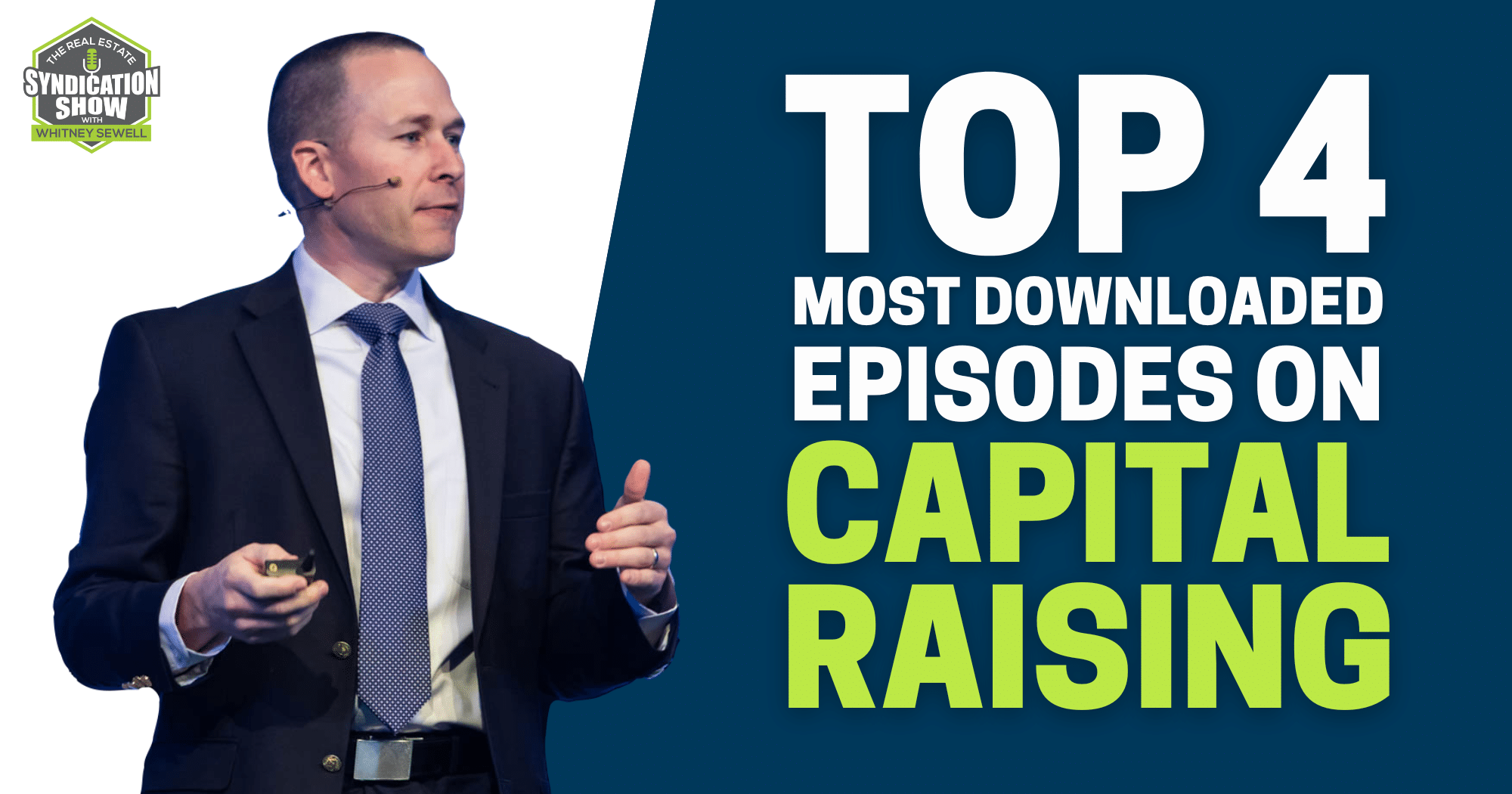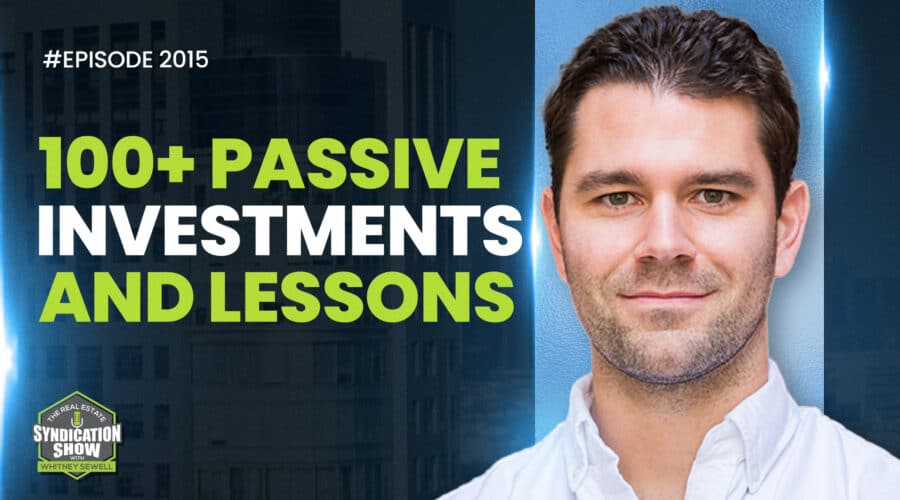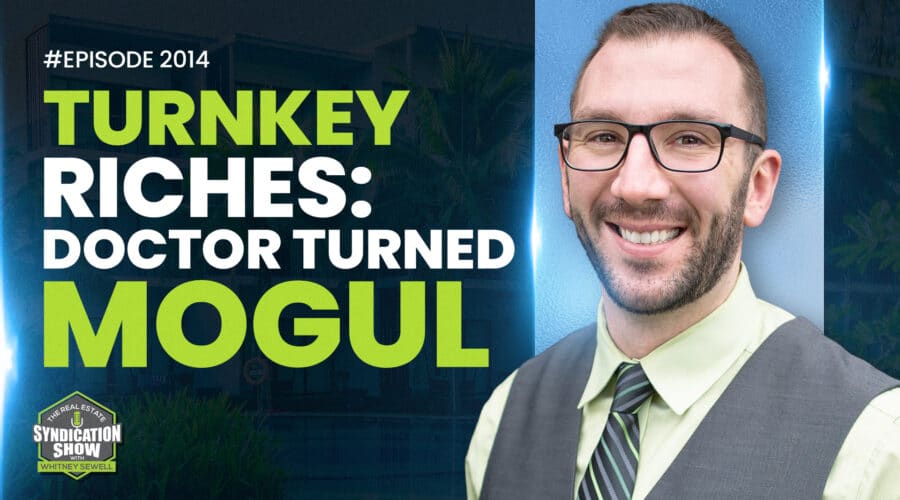In this episode, we look back at our conversations with Andrew Davis, Peter Halm, Hunter Thompson and Michael Wayne. Our discussion zeroes in on capital raising. Andrew talks about his strategies in relationship building, while Peter shares a system that he uses to identify suitable investors.
Watch the episode here:
Listen to the podcast here:
Hunter, on the other hand, shares how he created an infrastructure to attract people who are already interested in a particular type of investment. Finally, Michael tells us how his company attracted people to bring capital to his projects.
Listen, learn and add these simple steps to raise capital in real estate!
Key Points From This Episode:
- What does Andrew Davis look for in investors?
- What conversations matter a lot to Andrew?
- What are the four personality traits that Peter Halm looks for in investors?
- How does Hunter attract leads?
- How did Hunter Thompson make a commitment to be a real estate investor and an entrepreneur?
- What data points do investors look for, according to Michael Wayne?
Tweet This!
“We have an incredible number of referrals, we have a very high number of repeat investors.” – Andrew Davis
“I think knowing that and knowing that those calls are never about me, they’re never about my team. It’s always about what does this person need?” – Andrew Davis
“So they’re more about having a relationship with you. They want to see that the property is doing things for its tenants in the community.” – Peter Halm
“We kind of get an understanding of the investor’s personality code, when it comes to how they operate and money and all that. And then we act accordingly.” – Peter Halm
“I went through a 30-minute presentation about the mobile home park business and talked about how all these baby boomers are hitting the age of retirement.” – Hunter Thompson
“I think it was easy for investors to see those data points and find confidence in the same vision that we had. And a lot of them are from the area so they’re familiar with the general vicinity.” – Michael Wayne
Links Mentioned in Today’s Episode:
Vineyard Investment Partners website
Vertical Street Ventures on LinkedIn
Detroit Riverside Capital website
WS1171 Full Episode with Andrew Davis
WS1152 Full Episode with Peter Halm
WS1297 Full Episode with Hunter Thompson
WS1048 Full Episode with Michael Wayne
About Andrew Davis
Andrew Davis is the Director of Investor Relations for PassiveInvesting.com, a commercial real estate private equity group approaching $1B in AUM, primarily in multifamily and self-storage assets, and with a long-term goal to be invested in multiple recession-resistant asset classes. In 2021 alone, they raised $175MM in capital from private retail investors. He is focused on capital formation, building long-term relationships with investor partners, driving awareness of the PassiveInvesting.com brand & mission, and creating a best-in-class investor experience. He began his career in sales, working for F500 consumer packaged goods companies, receiving multiple promotions, and developing leadership, sales, marketing, and operational experience. Passionate about real estate investing since his early college years, he began the “side hustle” of investing in single-family RE in his 20’s and raised capital from friends, family, and in some cases complete strangers to acquire his first few deals. Andrew is originally from Portland, OR. He and his wife Isabel now live in Asheville, NC with their golden-doodle Piper. They are active in their church, love to be outdoors, and travel whenever they get a chance. Andrew is fluent in Spanish, an avid pickleball player, a voracious reader, and is currently training for a marathon.
About Peter Halm

About Hunter Thompson
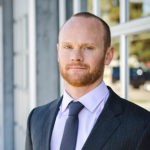
About Michael Wayne
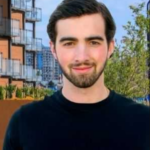
Full Transcript
EPISODE 1629
[INTRODUCTION]
Whitney Sewell (WS): This is your Daily Real Estate Syndication Show. I’m your host, Whitney Sewell. Today, I hope you enjoy our episode, the most downloaded shows on capital raising.
[INTERVIEW 1]
WS: Our guest, Andrew Davis, works for PassiveInvesting.com, a real estate private equity group with $1 billion of assets under management. Talk through that a little bit at this level at this scale, how you build relationships and how you’re securing that trust to the listeners can think at that scale as well, I think until you can, like see somebody that’s done that it’s hard to even imagine it right. That’s even possible. And so open their eyes a little bit, Andrew, to how you all do that.
Andrew Davis (AD): Yeah, you bet. You bet. So, I am a piece of what PassiveInvesting.com is and what we’re becoming. And so, I think just to pull it back, right? Like, hey, we have incredible leadership, right? These are high-integrity guys that are 100% aligned on every deal, right? They’re putting large chunks of their own capital on every single deal, and have incredible experience and high integrity. Really, if you were to kind of consolidate the mission down, it’s to build wealth alongside our investors for generations to come.
And so I think we had this company Christmas party this weekend. And I got to get up and just chat a little bit about kind of what we’ve done. And you know, the thing I said, Gary Vee posted something I don’t know, a little while ago. And he basically said, selling is only difficult if you don’t believe in what you sell. And I was able to go through the room and look at every single person, every single team, and tell them, “This is why you make my job so easy and so fun.
Because I know I can look at our acquisitions, guys. And I know they’re underwriting these deals conservatively.” I think on our current deal, we’re on version 30 of the underwriting, right? I mean, they are deep-diving every single aspect of it. Our Investor Services team, our marketing, our self-storage leads, our managing partners, every single person in our group makes my job very, very easy. And then, of course, you’ve got the leadership and this amazing marketing team, right, which we’re everywhere. And so, I get to just sort of manage all the incoming leads in the funnel.
And so, I do want to just be extremely clear that by the time I’m having these investor conversations, there’s already been a lot of a relationship that’s been developing, they’ve heard about us, they’ve seen us. We have an incredible number of referrals, we have a very high number of repeat investors. We have about a 62%, repeat investor rate. So at any given deal, three out of the five investors are going to be investing with us for the second, third, fourth, sometimes 6/9 10th time. And so, we’re very, very fortunate to have just a really wonderful group of investors.
But I think that I’m really wanting to replicate what I do. I think that when people think about the capital raising process, if they’re new to it, or they haven’t had a lot of experience doing it, it can feel scary and intimidating. And they think that they’re going to get past all of these deep dive underwriting questions, they won’t be able to answer that every single person on the phone is going to have some gotcha question. And the reality is, is that the mindset that I really have cultivated in myself, and then the mindset that I will be cultivating in my team is that we’re providing a tremendous amount of value. There’s no arrogance or pride there, it’s a privilege to be able to do that. But just like we value, our investors so much need capital for deals, they need a great place to put their capital that’s going to deliver high returns, and that they can sleep well at night.
And so when I’m preparing for these investor conversations, I’m having these calls, I’m not whacking them over the head with all the numbers, if that’s not what they want to talk about, really only about 5% of investors really want to go deep on numbers and look at the proforma and analysis, the majority of them, they have a list of questions, but what they’re really asking at the end of the day is are you competent? Can I trust you? And can I really have my capital over to you, and then get back to enjoying my nights and weekends?
And I think knowing that and knowing that those calls are never about me, they’re never about my team. It’s always about what does this person need? I feel 1,000% confident in what we’re doing, and our ability to steward their capital well, and it’s really just finding out what they need. And some people do need to get on the Zoom call and go through the underwriting for 30 minutes and that’s fine, but most people don’t. They want to get to know us, they want to get a sense for who we are and what we’re doing.
[INTERVIEW 2]
WS: Today, our guest is Peter Halm. Peter, also known as The Deal Hunter. Peter is president of Vineyard Investment Partners where he is responsible for finding investment opportunities and forging strategic partnerships together with his wife and partner, Monique, they bring groups of investors together to purchase commercial property. Their specialty is working with investors raising capital, but something that happened recently in their businesses switching asset classes.
The pandemic changed maybe the way they looked at some specific asset classes. They were in. Peter goes into that in some detail. I’ve seen that happen personally many times and about that with many other people. So your capital raising, I want to dive into that a little bit. I mean, this is your specialty. And maybe we can start with some tools, things that you all have learned that work best for you all. And then maybe we can jump into some best practices as well.
Peter Halm (PM): We make sure that we have a personal relationship with investors what some of our raises are accredited only. Some of them are for everyone, we make sure we have some kind of relationship. And for us, it’s like, you know what, we don’t really care if you get into this one relationship, we’ll always find another investor. But we want you to feel comfortable so you can be a repeat investor. So for us, it’s all about making the investor feel really comfortable. And this is a really interesting thing. We like to do this with investors. We like to understand their personality, so we can speak to them, we use a system called BANKCode and go to their website www.bankcode.com. And what happens is someone does a really quick personality test. And we can then tell whether they are a what’s called a B — Blueprint, kind of like the accountant numbers type, they just want to crunch numbers; A — Action, whether the action person is someone who’s like, we don’t care about the details, just get to the point, just give us the bottom line, then there’s N. That’s Nurture. and nurture is somebody, they love doing stuff in community with people where everyone wins.
So they’re more about having a relationship with you. They want to see that the property is doing things for its tenants in the community. And then there’s K, the last letter, which is Knowledge, the other people who want to deep-dive into research. So, when someone tells us that the first letter that comes up is Knowledge. It’s like, okay, so here’s the offering memorandum, here’s all the information on the market, basically hit the red rolls, you can go through everything, you can spend your time, and they’re very happy to go away and spend hours and hours and hours, just getting that knowledge.
And then when they feel comfortable. If they do, they’ll come back to you and say we want to invest. And the action people are like, we know that if we sent all that stuff over, they’d be like, Okay, this is just too confusing to me, I’m moving on to something else. So, we kind of get an understanding of the investors personality code, when it comes to how they operate and money and all that. And then we act accordingly.
WS: I think it’s so interesting. I don’t think I’ve ever heard anyone talk about having investors complete a personality test. I think that’s so neat. Because what you just said, right? I mean, you can understand a little more about how they think. And you can adjust accordingly. Because exactly what you just said, some people, I mean, you’re talking to an engineer, right away, they want to see the numbers, they want to see the details.
They’re gonna be “I’ve got somebody else to stay up till two in the morning, like analyzing every number,” right? A few of those. And then there’s some if you sent that to them, like you said, well, that almost scared them to death. They’re just like, No, I trust you all. And I want them to see it. But some of them are just like, it’s just too much information, right? All at once. All right,
PH: Yeah, I’ve lost investors on calls where I’ve just gone into details. And they’re like, you know, you could probably see them looking at their watch going, you know, this isn’t for me, this is like, I’m not feeling this, and they just want to get off the call and go.
[INTERVIEW 3]
WS: Our guest is Hunter Thompson. Everybody listening is trying to raise capital most likely, or they’re working with somebody that is, you know, that is raising capital one way or the other. But for that person who’s trying to get into this business, it’s not always that it’s as easy as what everybody thinks it is, right?
Or you see somebody who’s, you know, been running a podcast, or they have some other type of thought leadership platform, or they’re creating content, or they, maybe they’ve done a few deals, and all of a sudden, you know, it looks like wow, you know that they’ve got it all together, or it just happened for them, right. But it doesn’t just happen.
Hunter Thompson (HT): It doesn’t just happen at all. And I’ll just start off by saying this. And hopefully this doesn’t offend some of your listeners, especially those that have worked in the real estate business for a long time. But there is no consistently sought after, and lucrative, consistently lucrative skill in the entire real estate business than on the capital raising side. Now, that may not be what everyone wants to hear. But that’s the reality of the situation.
And from my perspective, it always will be. I was at a conference recently and someone said is the money in the deal or isn’t the money in the money, and I’ve come to realize that the money is in the money. And right now there’s this unbelievable opportunity to create a highly scalable, highly “replicatable” infrastructure to attract leads, nurture them and close deals.
But to your point, I got into the business with a little bit of background in sales, a lot of confidence and had a lot of success investing in real estate for my own personal portfolio, my family’s portfolio just similar to like a model of the family office where I was trying to help my mom invest, trying to help my sisters invest and grade a track record around the mobile home park business, I realized that the track record was working, the valuations were still favorable start in 2011, working in 2013 or so. And I thought, this is actually a scalable business, I’m going to create a business around passive investing.
And I decided to create my first fund in 2013. And in order to fund this fund to scale the business, I had a luncheon where I was going to invest and invite a lot of friends and family. They could even invite their plus ones if they wanted to, and had to be accredited investors to attend. And I had this luncheon. Thirty people came, all were accredited investors to about $30 million of net worth, probably on average in this room. I was really knowledgeable. I was passionate about it, I had taken this due diligence process far more seriously, more serious than any of the attendees. I went through a 30-minute presentation about the mobile home park business and talked about how all these baby boomers are hitting the age of retirement.
They’re not building any new mobile home parks. It’s an unbelievable situation, you got the nuances of the asset class, like the fact that the tenants actually own the homes, which means they’re more likely to stick around longer the private ownerships. There’s many reasons why the mobile home park business is just so compelling, it sells itself. And I had agreed with an operating partner that I’m confident we can come up with half a million dollars. There’s $30 million in this room. I have a background in sales, I know how to communicate, let’s do it, and went through the presentation. And $0 was invested – an absolute goose egg. And this is like, as an entrepreneur, I can talk about it now. But I’m talking about how it took me months emotionally to get over this. It was terrifying. I mean, I had made a commitment to be a real estate investor and an entrepreneur. And there couldn’t be a more clear red light than this experience. And so after months and months of thinking, How is this the case?
Like, do I not know what I’m doing? And I did not communicate clearly enough. I realized that what I was thinking was all the amazing reasons that people are going to be blown away by this was all the reasons that they were completely turned off. They weren’t interested in this type of thing. Most of them have never even invest in real estate, let alone mobile home parks. And if they were interested, they would have been investing. And the example I use in the book, let’s say someone came to you and said, Hey, I got a great deal on these dairy cattle. These cows are amazing. They produce 30% more milk than any other cow. And we’re gonna get them at pennies on the dollar. You say that sounds like a great deal. Who wouldn’t be interested in dairy cows at pennies on the dollar? Well, I’ll tell you who, me and you. Because what are we going to do with that? I’ve never been interested in dairy cows. It doesn’t matter how good of a deal, it doesn’t matter how compelling the investment thesis is.
So, what I had to do was create an infrastructure to attract people who are already interested in these types of investments, nurture them through an educational platform, and then close deals. And so, one of the things I want to talk about today is kind of how you can go about this, because there’s never been a better time in the history of real estate than to do this and to put effort towards building this infrastructure.
[INTERVIEW 4]
WS: Our guest is Michael Wayne. Michael is a co-founder of Detroit Riverside Capital and serves as the head of project management. He’s responsible for the construction management, Capital Management and investor relations for DRC projects. He holds a Bachelor of Science in Entrepreneurship and Corporate Innovation from Indiana University, Kelley School of Business. So, an interesting thing about Michael is he is 25 years old. And he just completed his first development of 43 units. It’s a mixed-use space. But you know, it’s interesting, let’s say, I don’t know how long ago you started that project.
But I know there’s some listeners that are thinking now wait a minute, you know, at 25, you’re probably 23 or four at the time, you know, we started this project, how do you get people to take you seriously? You named off all these architects, right? And I know the listeners are thinking now wait a minute, what was that list of architects? How many of those people don’t need to, you know, reach out at that age? How do you get them to take you seriously, you know, you’ve not done this before? You know, they’re thinking now, wait a minute, who’s this market guy? You know, is he really going to do this? Do I give him much of my time? How do you handle that?
Michael Wayne (MW): Yeah, so I think some of it was leveraging some existing relationships. So, in the case of our construction manager, for example, we had a connection to someone that was involved with that company. And so, we had a new character reference there, and we had worked with this contact before on previous real estate related stuff. So that was a good segue, and I think just like the sheer size of the project, and the fact that we were able to finance a project like that, in the consultants’ eyes gave them the confidence that they needed, because ultimately to the to the consultants, like if the project is feasible and is financed like they’re getting a job.
So like, that’s really what they’re looking for is someone that can bring the capital and reasonably successful off a project like this. And I think that they just saw that capability in us. And certainly, we had the financing backing, which I haven’t touched on yet, but I certainly can. And the combination of those two things, I think, in the consultants, helps to take it seriously. But I mean, there’s certainly moments with the lender early on, or with municipal people early on, you know, whether it be the city council, or any of the various staff members, having zero experience, and never having talked to anyone at a city about any project before was very challenging. So, I don’t mean to paint that it was roses and daisies the whole time. It’s the hardest thing I’ve ever done in my life without a question. But we were resilient and strategic, and moved quickly and executed what we needed to and found success in that.
WS: Did the capital come from the consultant? Or how did you raise the money?
MW: So we raised about $1.8 million in equity. And while $7.2 million in debt to equity was a group of 12, you know, started out as friends and family style investors. And then some friends of friends came aboard. And we basically just built a team of limited partners that were all seeking cash flow from, you know, a development operation. So, the financing process in Jordan was extremely easy. I mean, we talked to like 14 people, and 12 of them wanted to come aboard. And I think that’s because the overall premise of the project was very easy to see, like if you stood on this site downtown, it just made sense that a big four-story apartment building was like supposed to go here. And it just felt like that was going to be a powerful thing.
And then if you’ve looked at the market, demographics, but the metrics of you know, like vacancy rates and rent growth, median income, all of which are very strong in the Auburn Hills market. So, I think it was easy for investors to see those data points and find confidence in the same vision that we had. And a lot of them are from the area so they’re familiar with the general vicinity. And like my dad’s case, like he grew up down the street and used to work at the restaurant, that’s kitty corner for the project. So, at a personal level, we’re familiar with this area. And I think that confidence and that understanding was helpful for our investors to feel the same way about the area.
[END OF INTERVIEW]
[OUTRO]
WS: Thank you for being with us again today. I hope that you have learned a lot from the show. Don’t forget to like and subscribe. I hope you’re telling your friends about the Real Estate Syndication Show and how they can also build wealth in real estate. You can also go to LifeBridgeCapital.com and start investing today.
[END]
Love the show? Subscribe, rate, review, and share!
Join the Real Estate Syndication Show Community:

